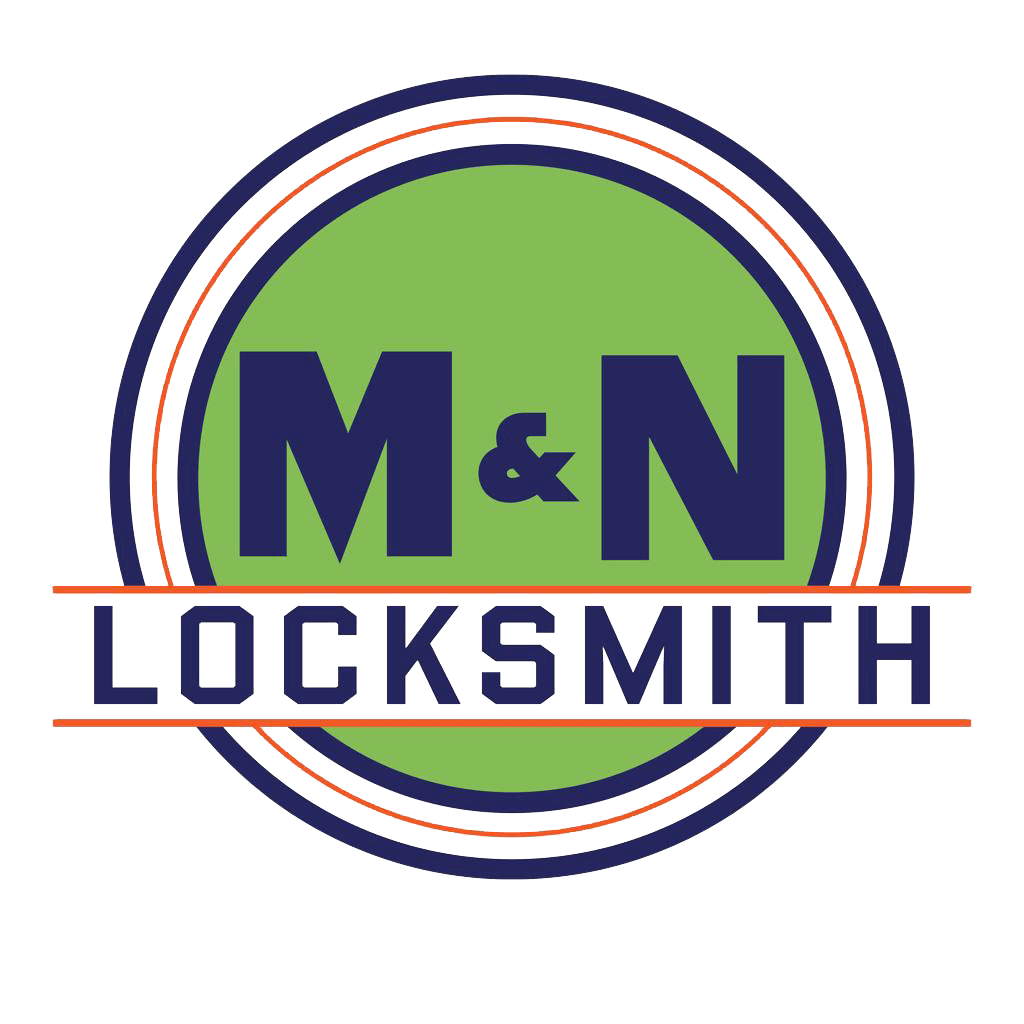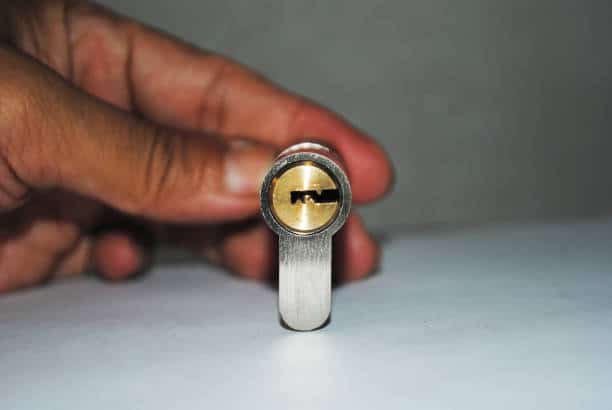Cylinder locks are one of the most commonly used types of locks worldwide. Whether it’s your front door, office, or even your car, chances are you’ve encountered a cylinder lock at some point. But have you ever wondered how these locks work?
A cylinder lock, also called a pin tumbler lock, is a kind of lock that utilizes the mechanism of a cylindrical key. The core part of this locking device is the lock cylinder which holds essential parts like keyway, pins, springs, and many others. Once the correct key enters the cylinder, its pins are aligned at the shear line which makes it possible for one to turn and open the door.
In this article, you might expect the following topics;
- Parts of Cylinder Lock
- Advantages and Disadvantages
- How Cylinder Lock Provides Security
- Common Issues and Troubleshooting
- When To Call A Professional Locksmith
- Tips for Maintaining and Prolonging the Lifespan
Understanding the Parts of a Lock Cylinder
To get a better understanding of how cylinder locks operate, let us examine closely various parts that make up a lock cylinder:
- Keyway: This groove or channel runs along the length of the cylinder thus allowing insertion of a key.
- Pins: These tiny cylindrical metallic pieces dwell inside the cylinder and are divided into two kinds known as driver pins and key pins. While driver pins rest above the shear line on which they rest below when placed correctly with a proper key; all these pins align themselves at the shear line enabling the turning around of such pin so that it can unlock.
- Springs: For proper functioning of this sort, springs must always be present. They push down on these pins to hold them into place while still allowing their smooth motion when inserting or extracting keys.
- Cylinder Housing: All elements within may include other elements such as those found within to stabilize it structurally providing support to the fragile mechanism inside, thus constituting an outer shell around the lock-cylinder holding together everything within it including mechanical items.
Different Types Of Cylinder Locks
These types come with several features and benefits exclusive to each type. For instance, we have some common categories;
Single Cylinder Locks
These locks contain one side with steel used for thumb locking while another side constitutes a hole having a keyhole. They are used mostly in residential places since they offer convenience and simplicity in usage.
Double Cylinder Locks
For double-cylinder locks, both sides should be opened by using keys to provide better security although it could lead to a problem in an emergency because if you want to leave the building, you will need to have a key with you.
Euro Cylinder Locks
These locks are popular in Europe due to their adaptability and quick replacement without requiring a complete overhaul. They gained popularity in Europe and are now increasingly widespread worldwide.
Mortise Cylinder Locks
These types of cylinder locks are usually found in commercial buildings. They offer excellent security and have been known for their strength due to being fitted inside mortise lock bodies.
The Benefits And Drawbacks Of This Type Of Locking System
Consequently, just same as any other lock; this type of door-locking mechanism also has its advantages and disadvantages which I am now going to tell you about;
Advantages
- Versatility: Cylinder locks can be easily rekeyed or replaced without changing the entire lock, making them a cost-effective solution.
- Accessibility: Many different types of keys might fit into these cylindrical designs including electrical cards, traditional ones plus even electronic fobs.
- Security: When combined with quality materials installed appropriately; this kind provides a higher level of safety than others.
Disadvantages
- Picking vulnerability: Cylinder locks can be susceptible to picking if the pins are not properly aligned or if the lock is of low-quality construction.
- Limited Key Combinations: Some cylinder locks have a limited number of key combinations, which can increase the chances of unauthorized key duplication.
How Cylinder Locks Work to Provide Security
Cylinder locks use various basic components to ensure that these locks are secure.
- Key Control: Cylinder locks with restricted keyways and unique key combinations offer better key control, reducing the risk of unauthorized key duplication.
- Forced Entry Resistance: High-quality cylinder locks are built to withstand various forms of forced entry, such as drilling, picking, and bumping.
- Grade Ratings: Cylinder locks often come with grade ratings, indicating their level of security. Higher-grade locks offer better resistance against manipulation and forced entry.
- Proper Installation: The security of a cylinder lock also depends on its proper installation. A professional locksmith ensures that the lock is correctly fitted and aligned, maximizing its effectiveness.
Troubleshooting Common Problems with Cylinder Locks
The truth is that at times even highly dependable cylinder locks may have problems. Here are some common ones that can occur and how they can be solved:
- Key Will Not Turn: In case your key does not fit easily or sticks inside the door try using a lubricating substance made specifically for this purpose. If this fails then it means there is a need to involve a professional locksmith.
- Key Snapped in Keyway: Never attempt to extract a broken key from your lock by yourself if you ever find yourself in such a situation because you could end up causing more damage than good all along. You should contact a professional locksmith who would utilize his tools to retrieve it safely.
- Locked Cylinder Jammed: If the plug gets stuck in its barrel, do not panic; just examine it for any foreign objects or debris blocking it. Wipe it carefully before trying again. If this problem persists contact an expert in lock systems to avoid any further damages that may happen when trying to remove debris or other materials stuck into the hole.
When To Contact A Professional For Your Cylinder Lock Needs
While you can fix minor problems relating to your cylinder keys without seeking external help from professionals sometimes you may need to call a locksmith.
Lost Keys
Hire a locksmith to rekey and replace cylinder locks in case of lost or stolen keys to prevent unauthorized access.
Faulty Locks
If your lock isn’t functioning properly, seek an experienced lock expert to analyze the issue and identify the root cause.
Security Upgrade
A skilled locksmith can install high-security cylinder locks to enhance your premises’ security, suggesting customized locks for your specific needs.
Tips For Extending The Life Of Your Cylinder Locks
To keep your cylinder locks in tip-top shape and lasting long grab hold of these few critical maintenance measures:
- Regular Cleaning: Clean dirt and other types of debris from the lock mechanism using a soft brush. Do not use harsh chemicals as they could damage internal lock components.
- Lubrication: Use appropriate lubricants designed specifically for locks for them to function smoothly. Avoid over-lubricating since this attracts dust and grime accumulation.
- Avoid Excessive Force: Never force the key as it can bend or snap off in the lock cylinder thereby destroying both the key and the lock’s functionality.
- Scheduled Maintenance: After regular intervals check out all door hardware which includes latches, hinges, and latch strikes. Any observed malfunction instantly restores or repairs the affected component to prevent further destruction or security failure risks.
Conclusion
Cylinder locks are an integral part of our daily lives, providing us with security and peace of mind. By understanding their functionality, parts, and security features, we can make informed decisions about installation, maintenance, and troubleshooting. Remember, when in doubt, it’s always best to consult a professional locksmith for any issues or concerns relating to cylinder locks.
Frequently Asked Questions
1. How can I tell when my cylinder lock needs to be replaced?
If your cylinder lock shows major wear, such as difficulty turning the key or frequent breakdowns, it may be time for you to consider buying a new one. A professional locksmith assesses and advises on it.
2. Can I re-key my cylinder lock myself?
To ensure correct cylinder lock rekeying, it’s essential to consult a professional locksmith, despite the use of specialized tools.
3. What is the life expectancy of normal cylinder locks?
How long a cylinder lock lasts is dependent on several factors including quality of the lock, use, and maintenance. On average, a well-maintained cylinder can last between five and twenty years.
4. Are there any limitations on the doors where cylinder locks can be installed?
Most door types i.e. wooden doors, metal doors, and UPVC are compatible with this kind of lock but should be discussed with an expert in this field regarding the type of door that suits best various people’s opinions.
5. Are there other alternatives apart from using Cylinder Locks?
There are also alternative types of security systems such as electronic locks, combination padlocks, and smart locks having different features and abilities so that they meet multiple security requirements according to each user’s preference


